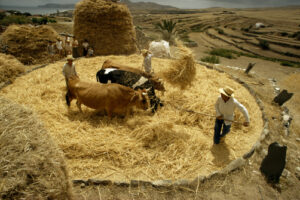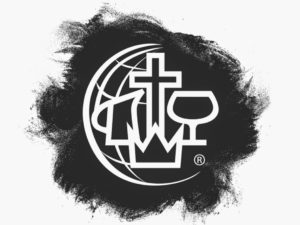Margins of Miraculous – From Thresher to Threshed; the story of Ornan by Shawn Blythe

The story of Ornan often gets lost among the various exploits of David. We know very little about him other than he is a Jebusite, had at least four sons and owned a threshing floor on Mt. Moriah. We are introduced to him as part of the narrative recording David allowing his pride to get the better of him as he ordered a full census of the people of Israel despite his army commander Joab’s deep reservations. David moves forward anyway with the result being three days of destruction being inflicted upon the people of Israel.
It is at the point when the angel of the Lord is poised to destroy Jerusalem that God pauses the devastation near the threshing floor of Ornan. The story is included in both II Samuel 24 and I Chronicles 21 (where his name is referenced as Araunah), but it is only the II Chronicles version that records the fact that Ornan and his sons working with him actually saw the angel of God (which promptly led his four sons to run away and hide – which seems a reasonable course of action to me).
There is nothing to indicate that Ornan’s threshing floor was significantly different than any other threshing floor in the region. It would have been in a high, open place to take advantage of the wind to help separate the grain from the chaff and would have had a hard flat surface to assist in dislodging the grain from the stalks.
With the sword of destruction poised over Jerusalem, David is instructed to build an altar at this location. We then have an interesting financial negotiation in which Ornan offers the site that David wants as a gift, but David insisting that he pay full market value. Eventually David pays 50 shekels of silver for the threshing floor and the oxen, allowing him to proceed with the sacrifice.
There are three things of interest to me in this story. The first is that Ornan was simply doing what threshers do when suddenly heavenly events interceded in his life. As a Jebusite, he was part of a tribe descending from Noah’s grandson Canaan who ruled Jebus until David defeated them in battle and renamed the city Jerusalem. They were a tribe that the Israelites were explicitly warned to avoid due to their idolatrous practices and were long-standing enemies of Israel. In other words, Ornan likely had no basis to believe that he would or could be part of anything positive related to the God of Abraham. Yet when this day came, he was ready to give away his threshing floor to David for nothing. He was apparently a man who recognized that circumstances had changed and the things that were important yesterday were no longer important today.
The second is that David felt it necessary to buy the threshing floor and oxen from Ornan for a fair price. While Ornan is offering it for free, David is insisting on paying full market value with his statement that he will not offer up a sacrifice that cost him nothing. In other words, David recognized that the entire point of a sacrifice is that it must cost you something. This is why the widow’s offering in Jesus’ time was so moving to our Messiah – it cost her everything that she had.
But the third and most intriguing element of this story to me is the nature of a threshing floor. As the sword of the angel destroying Israel is poised above them, God selects a threshing floor for the site of his altar. It was a place that was specifically designed to separate good from bad. The threshing floor was a reference of coming judgement for Israel used by Hosea (Hosea 13:3) while it was a place of redemption for Ruth (Ruth 2:8 – 13). But ultimately, we all come to the same threshing floor awaiting our Messiah who will separate the good grain from the chaff (Mathew 3:12).
Of course, Ornan was unlikely to have known about Ruth and Boaz; and the subsequent events of Hosea’s prophecy or John the Baptist’s testimony about Christ were still to come. He also could not have known that his simple threshing floor was located on what would become known throughout the world as the Temple Mount. It would be the site of Solomon’s temple and would be a place of conflict over thousands of years.
I often wonder if, after having received an additional 600 shekels of gold from David for the land surrounding the threshing floor if he ever returned to the site to watch Solomon build the temple? Did he regret not demanding more money for what would become an extremely important piece of land? Or perhaps he recognized that the physical structure built over his threshing floor had not actually changed the fundamental purpose of this piece of land at all. It remained a place where good was to be separated from bad – but rather than being the thresher, Ornan would be the threshed.
Ornan is never mentioned again in the Bible. Ornan’s entire life was likely an adversarial one with both the Israelites and the God of Abraham. An approaching King and a heavenly apparition intent on destruction were likely not indicative of a change in that adversarial relationship. I cannot even imagine what he may have been thinking when he saw the spectacular display of power that must have been evident in the angel over Jerusalem that day. But in the face of what must have been confusing and conflicting priorities, Ornan recognized the significance of the event and effectively relinquished his earthly claim on this land and exited our narrative.
In one brief moment, Ornan recognized that yesterday’s priorities were not relevant today. David recognized that his sacrificial worship had to cost him something. And a place established for the common harvesting practice of separating grain from chaff would ultimately be the place God selected for his altar and temple. It is worth reflecting on our priorities and what our worship is costing us. It is worth considering our own personal effort to separate ourselves from sin before we approach the throne of God.
Ornan found himself standing between a piece of land, an angel of destruction and the King of Israel. He new nothing of the Temple at this point and would never meet the Messiah who would walk this land hundreds of years later. We, on the other hand, are well aware of the context – the origins and ultimate destruction of the Temple. We know of the Messiah and perhaps even have a personal relationship. But regardless of our circumstances, we, like Ornan, will ultimately end our personal journeys at the same threshing floor – where our Savior and Judge awaits with winnowing fork in hand.


